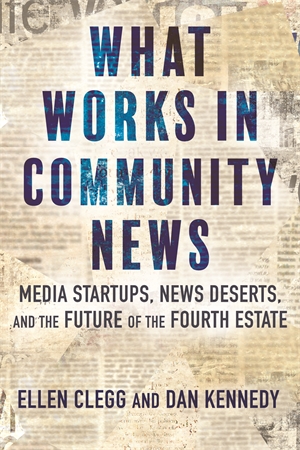
I was thrilled to attend the Mass Book Awards ceremony at the Statehouse earlier today, when “What Works in Community News: Media Startups, News Deserts, and the Future of the Fourth Estate,” which Ellen Clegg and I wrote about possible ways out of the local journalism crisis, was recognized as one of the top dozen nonfiction books in Massachusetts.
Our book was one of nine that were longlisted. In addition, the top nonfiction award went to “We Refuse: A History of Black Resistance,” by Kellie Carter Jackson, with honors going to “Freeman’s Challenge: The Murder That Shook America’s Original Prison for Profit,” by Robin Bernstein, and “Exit Wounds: How America’s Guns Fuel Violence Across the Border,” by Ieva Jusionyte. The awards are sponsored by the Massachusetts Center for the Book.
Unfortunately, Ellen wasn’t able to make it, but I was honored to attend and be recognized along with the other winners.
It was also great to reconnect with Gayatri Patnaik, the director of Beacon Press, who embraced our vision and helped bring it to fruition. Our immediate editor, Catherine Tung, has since moved on to a senior editing position at Farrar, Straus and Giroux, but she provided crucial support when we lost a year during COVID. She also gave us good advice that we tried to follow in our reporting — to assess how well the local news projects we were writing about were covering arts and culture, a crucial part of civic life. That said, most of them weren’t, with the New Haven Independent and its affiliated low-power radio station, WNHH, standing as notable exceptions.
I’m also proud of the professional partnership Ellen and I have developed as we’ve built out the book into a wider project, What Works: The Future of Local News, based at Northeastern University in the School of Journalism and affiliated with the Center for Transformative Media. What Works comprises a frequently updated website on developments in local news; an every-other-week podcast featuring news entrepreneurs and thought leaders; conferences and webinars; and a database of independent local news organizations in Massachusetts.

 A little over five years ago, at a Chinese restaurant in Harvard Square, Ellen Clegg and I sketched out a rough outline for the book that would become
A little over five years ago, at a Chinese restaurant in Harvard Square, Ellen Clegg and I sketched out a rough outline for the book that would become 
 Ellen Clegg and I are thrilled to go public today with our book,
Ellen Clegg and I are thrilled to go public today with our book, 